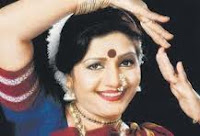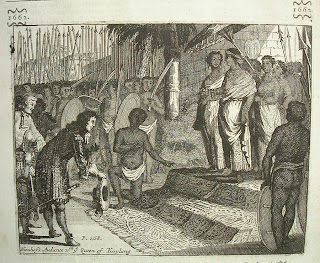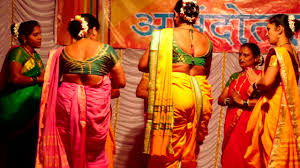Puppet Play for Gond Tribes by Gond Tribes and in Gond Tribal belt of Adilabad
India is the home to a large number of aboriginal people known as Adivasi meaning tribal people. These primitive tribal people live in secluded places near like hillocks, forest zones, away from the by the lifestyle of the modern world. These tribal people are the poorest in the country, who is still dependent on gathering food, hunting, agriculture, and fishing. The tribal people have their own culture, tradition, language and lifestyle. This allows outsiders to get an insight into many different cultures of tribal India.
Tribes in India constitute 8.61% of the total population of the country, numbering 104.28 million (2011 Census). Raja Gonds tribes are one among them. Gonds tribes (Tribes are known as Adivasi) are spread across Telangana, Maharashtra and are also in Madhya Pradesh. Adilabad District of Telangana is a hub of Gonds, Kolams, Andha, Pradhan, Thoti, Nayakpod and other primitive tribes. Gonds dominate in number over other tribes.
The Indian Constitution recognizes only 22 languages –out these only two are adivasis languages, namely, Santhali and Bodo that are included in the Schedule of Languages. However, there are numerous tribal languages that have not found recognition or in the education system.
Gonds speak Gondi language, whereas, Kolams speak Kolami--it’s quite new, interesting and funny too. Interestingly, Gondi language belongs to Dravidian family of language and is related to Tamil and Kannada. I liked the language and as an eager language learner, I am now learning this language
"Samdirkun Ram Ram", "Sandir Chokad Mantir?", "Nemot Chokad Mandana, Mamotta Chokata Mandana, Samdir Chokota mandana", “Bonn batalata, Vyaha.. Bheemu Vyaha…” “Bagamanti?” “Gato Thintii?”---This is Gondi
“Sadaran Ram Ram”, “yenanga Andatir?” , “Soya Andatira?”… this is Kolami.
A Kolam tribe can speak Gondi well but a Gond can’t speak Kolami language that easily is a general perception.
Had a splendid time going to the remote village on the hillock, midst of the thick Jodenghat forest, the glimpse of different shades of greens, water streams, waterfalls, valley, marshy roads, under sun and thunder…. It was fun and a good learning exposure. The morning freshness filled with fresh air, chirping of birds, cries of the infants, tribal women gladded in colourful gochi style sari.. oh!!! it was a new kind of experience for me.
There are villages with no power supply or with frequent power failures, remotely located, no access to the main road or public transport, medical facilities and so on. Yet a learning experience for me to know how confidently they lead their life and are quite happy and content with lifestyle.
Even though the basic needs were not met or accessible to them, they did not grumble or so. Maybe, they are used to it or they do not consider them as the major issues to grumble upon. Or maybe, their basic needs are quite different....
It was our fortune to be part of Health Awareness campaign programme of the Integrated Tribal Development Agency (ITDA), Utnoor, Adilabad to spread awareness on health issues using puppets among Gonds, Kolams, Lambadas in six mandals agencies of ITDA for six days. On the whole, we could cover 10-12 villages and around 30 ashram schools. The six mandals are Jainoor, Indravelli, Narnoor, Kerimeri, Sirpur (U) and Utanoor.
The ITDA wanted us to spread the health awareness message across the adivasis to reach out to the government-sponsored medicare, facilities for pregnant women and control pills given for free to check and prevent Malaria, diarrhea, dengue and viral fever.
The play is "Mava Jiva Mava Asthi" Health Awareness Puppet play presented in Gondi Language in six ITDA Utnoor Agency Mandals, Adilabad from August 25th to 30th, 2016 by Sphoorthi Team members: HK .Puneesh, Soyam Bheem Rao, Boyini Prakash and Kodapa Gajanand.
It was a completely new experiment to present a puppet play in Gondi language (the language widely spoken and understood by all tribes), for Gonds, Kolams and Lambada tribes, by Gond, Kolam and Koya youth.
Firstly, we and our puppets were accepted as both spoke in Gondi language. Again, we did receive a mix response about the play on health awareness and also this paved wave to the insight of status of indigenous medicinal practices among tribes, working of health department, reasoning for the failure of health services not reaching the tribes at the right time, insufficient health workers, or over workload assignment rested on the shoulders of the health workers and the health department.
Are these tribes who have educated youth in their families still are unaware of the modern health facilities support extended by ITDA?
The reasons for their hesitation non-acceptance or take modern medicinal pills?
Reasons for the prevalent ground superstitious practices (as it is called by non-tribes) among tribes with which the tribal community is quite comfortable.
However, all said and done, the puppet play lead to the healthy interaction and feedback which is the essential document for the ITDA, health department, health workers, teachers, village heads, leaders and Gond tribal community at large.
Tribes in India constitute 8.61% of the total population of the country, numbering 104.28 million (2011 Census). Raja Gonds tribes are one among them. Gonds tribes (Tribes are known as Adivasi) are spread across Telangana, Maharashtra and are also in Madhya Pradesh. Adilabad District of Telangana is a hub of Gonds, Kolams, Andha, Pradhan, Thoti, Nayakpod and other primitive tribes. Gonds dominate in number over other tribes.
The Indian Constitution recognizes only 22 languages –out these only two are adivasis languages, namely, Santhali and Bodo that are included in the Schedule of Languages. However, there are numerous tribal languages that have not found recognition or in the education system.
Gonds speak Gondi language, whereas, Kolams speak Kolami--it’s quite new, interesting and funny too. Interestingly, Gondi language belongs to Dravidian family of language and is related to Tamil and Kannada. I liked the language and as an eager language learner, I am now learning this language
"Samdirkun Ram Ram", "Sandir Chokad Mantir?", "Nemot Chokad Mandana, Mamotta Chokata Mandana, Samdir Chokota mandana", “Bonn batalata, Vyaha.. Bheemu Vyaha…” “Bagamanti?” “Gato Thintii?”---This is Gondi
“Sadaran Ram Ram”, “yenanga Andatir?” , “Soya Andatira?”… this is Kolami.
A Kolam tribe can speak Gondi well but a Gond can’t speak Kolami language that easily is a general perception.
Had a splendid time going to the remote village on the hillock, midst of the thick Jodenghat forest, the glimpse of different shades of greens, water streams, waterfalls, valley, marshy roads, under sun and thunder…. It was fun and a good learning exposure. The morning freshness filled with fresh air, chirping of birds, cries of the infants, tribal women gladded in colourful gochi style sari.. oh!!! it was a new kind of experience for me.
There are villages with no power supply or with frequent power failures, remotely located, no access to the main road or public transport, medical facilities and so on. Yet a learning experience for me to know how confidently they lead their life and are quite happy and content with lifestyle.
Even though the basic needs were not met or accessible to them, they did not grumble or so. Maybe, they are used to it or they do not consider them as the major issues to grumble upon. Or maybe, their basic needs are quite different....
It was our fortune to be part of Health Awareness campaign programme of the Integrated Tribal Development Agency (ITDA), Utnoor, Adilabad to spread awareness on health issues using puppets among Gonds, Kolams, Lambadas in six mandals agencies of ITDA for six days. On the whole, we could cover 10-12 villages and around 30 ashram schools. The six mandals are Jainoor, Indravelli, Narnoor, Kerimeri, Sirpur (U) and Utanoor.
The ITDA wanted us to spread the health awareness message across the adivasis to reach out to the government-sponsored medicare, facilities for pregnant women and control pills given for free to check and prevent Malaria, diarrhea, dengue and viral fever.
The play is "Mava Jiva Mava Asthi" Health Awareness Puppet play presented in Gondi Language in six ITDA Utnoor Agency Mandals, Adilabad from August 25th to 30th, 2016 by Sphoorthi Team members: HK .Puneesh, Soyam Bheem Rao, Boyini Prakash and Kodapa Gajanand.
It was a completely new experiment to present a puppet play in Gondi language (the language widely spoken and understood by all tribes), for Gonds, Kolams and Lambada tribes, by Gond, Kolam and Koya youth.
Firstly, we and our puppets were accepted as both spoke in Gondi language. Again, we did receive a mix response about the play on health awareness and also this paved wave to the insight of status of indigenous medicinal practices among tribes, working of health department, reasoning for the failure of health services not reaching the tribes at the right time, insufficient health workers, or over workload assignment rested on the shoulders of the health workers and the health department.
Are these tribes who have educated youth in their families still are unaware of the modern health facilities support extended by ITDA?
The reasons for their hesitation non-acceptance or take modern medicinal pills?
Reasons for the prevalent ground superstitious practices (as it is called by non-tribes) among tribes with which the tribal community is quite comfortable.
However, all said and done, the puppet play lead to the healthy interaction and feedback which is the essential document for the ITDA, health department, health workers, teachers, village heads, leaders and Gond tribal community at large.






























Comments
I am yet to work on my new posts. Once you start following my blog you will get notification of the same.
Regards
Sphoorthi Theatre